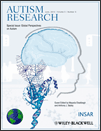
Autism Research
Scope & Guideline
Advancing knowledge, transforming lives in autism research.
Introduction
Aims and Scopes
- Neurobiological Studies:
Research exploring the neurobiological underpinnings of autism, including brain structure, function, and neurophysiology, often employing techniques such as fMRI, EEG, and genetic analysis. - Psychosocial and Behavioral Interventions:
Investigations into various intervention strategies for autism, focusing on behavioral therapies, family support, and educational practices that promote social skills and adaptive functioning. - Epidemiological and Prevalence Studies:
Large-scale studies aimed at understanding the prevalence, incidence, and risk factors associated with autism across different populations and demographic groups. - Developmental Trajectories:
Research examining the developmental milestones and trajectories of children with autism, including early indicators, language acquisition, and motor skills. - Cultural and Social Perspectives:
Studies that explore the cultural, social, and community contexts of autism, including the experiences of autistic individuals and their families within different societal frameworks. - Comorbidity and Mental Health:
Research addressing the co-occurring conditions often seen in autistic individuals, such as anxiety, depression, and ADHD, and their impact on overall functioning. - Technological Innovations:
Utilization of technology in autism research, including digital phenotyping, telehealth interventions, and the use of AI in diagnostics and intervention strategies.
Trending and Emerging
- Intersectionality and Diversity:
A growing emphasis on the intersectionality of autism with factors such as gender, ethnicity, and socioeconomic status, highlighting the diverse experiences of autistic individuals. - Longitudinal and Developmental Studies:
An increase in longitudinal studies tracking developmental changes in autistic individuals over time, providing insights into the long-term outcomes and evolving needs. - Neurodiversity Movement:
Research aligning with the neurodiversity paradigm, advocating for acceptance and understanding of autism as a natural variation of human experience rather than a disorder to be cured. - Parent and Caregiver Perspectives:
Emerging studies focusing on the experiences, challenges, and needs of parents and caregivers of autistic individuals, emphasizing the importance of their roles in intervention and support. - Technological Advances in Research:
A trend towards incorporating advanced technologies, such as machine learning and AI, to improve diagnostic processes and intervention strategies in autism research. - Mental Health and Well-being:
A heightened focus on the mental health aspects of autism, including studies examining anxiety, depression, and overall well-being among autistic individuals and their families.
Declining or Waning
- Traditional Diagnostic Approaches:
There is a noticeable decrease in research focused solely on traditional diagnostic methods for autism, as the field shifts towards more holistic and interdisciplinary approaches. - Overemphasis on Genetic Determinism:
Research exclusively attributing autism to genetic factors is waning, with a growing recognition of the interplay between genetics, environment, and individual experiences. - Single-Factor Studies of Interventions:
The prevalence of studies that investigate the effectiveness of single intervention types (e.g., behavioral therapies alone) is declining in favor of multi-faceted approaches that consider various factors influencing outcomes. - Static Models of Autism:
Research employing static models of autism that do not account for the dynamic and evolving nature of the spectrum is becoming less common, as the field embraces more nuanced and flexible frameworks.
Similar Journals
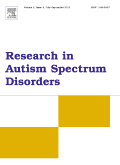
Research in Autism Spectrum Disorders
Driving the conversation forward in autism research.Research in Autism Spectrum Disorders, an esteemed journal published by ELSEVIER SCI LTD, is dedicated to advancing the understanding of autism spectrum disorders through innovative research and scholarly articles. Since its inception in 2007, the journal has carved out a distinguished place in the field, reflected in its robust 2023 Impact Factor and Q2 ranking in key categories such as Clinical Psychology, Developmental and Educational Psychology, and Psychiatry and Mental Health. By bridging the gap between research and practice, this journal serves as a vital resource for researchers, professionals, and students alike, fostering collaboration and knowledge-sharing among those dedicated to improving outcomes for individuals with autism. Featuring a broad scope that encompasses various aspects of autism research, the journal remains committed to publishing high-quality studies that drive the conversation forward in this critical area of study. Access options for the journal's content are available under the Elsevier guidelines, ensuring that pivotal research reaches a wide audience.
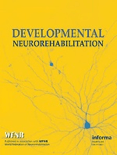
Developmental Neurorehabilitation
Catalyzing breakthroughs in neurorehabilitation for children.Developmental Neurorehabilitation is an esteemed journal published by Taylor & Francis Inc, dedicated to advancing the field of developmental neuroscience and rehabilitation. With an ISSN of 1751-8423 and an E-ISSN of 1751-8431, this journal serves as a vital resource for researchers, clinicians, and students interested in innovative therapeutic approaches and rehabilitation techniques for children and adolescents. Since its inception in 1997, Developmental Neurorehabilitation has focused on disseminating high-quality research, contributing to a deeper understanding of recovery processes in developmental disorders, and facilitating interdisciplinary dialogue among professionals. With its recognition in Q2 and Q3 quartiles across prominent categories such as Pediatrics and Rehabilitation, it stands out as a pivotal publication in its field, boasting Scopus rankings that reflect its significant impact—ranked #53 in Rehabilitation and #139 in Pediatrics, among others. While maintaining a commitment to quality research, the journal does not currently offer open access but remains accessible through institutional subscriptions, further enriching the academic landscape with critical insights into rehabilitation methodologies for developmental challenges and promoting better clinical practices to improve patient outcomes.

COGNITIVE DEVELOPMENT
Unraveling the Mysteries of Cognitive ProcessesCognitive Development is a prestigious academic journal published by Elsevier Science Inc, focusing on the critical area of developmental and cognitive psychology. With an ISSN of 0885-2014 and an E-ISSN of 1879-226X, this journal serves as a vital platform for the dissemination of innovative research, theories, and methodologies from 1986 to the present, with the latest articles contributing to a comprehensive understanding of cognitive processes in children and adolescents. Positioned in the second quartile (Q2) of both the Developmental and Educational Psychology and Experimental and Cognitive Psychology categories, Cognitive Development holds an essential place in shaping contemporary psychological research, boasting robust Scopus rankings of #175/360 and #90/165 in its respective fields. Though not an open-access journal, it provides valuable insights and rigorous studies essential for researchers, professionals, and students engaged in the intricate processes of cognitive development. Whether you're looking to publish significant findings or simply stay updated on the latest advancements, Cognitive Development is an indispensable resource in the psychological community.
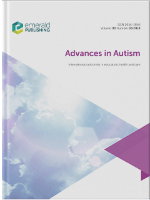
Advances in Autism
Exploring the Frontiers of Autism ResearchAdvances in Autism is a prominent academic journal published by Emerald Group Publishing Ltd, dedicated to the comprehensive exploration of autism spectrum disorders through the lenses of Cognitive Neuroscience, Developmental Psychology, and Psychiatry and Mental Health. Since its inception in 2015, the journal has made significant strides in disseminating high-quality research and fostering interdisciplinary collaboration within its diverse scope. With a respectable 2023 impact factor placing it in the Q3 category across multiple relevant fields, including Neurology and Clinical Psychiatry, Advances in Autism serves as an essential resource for researchers, practitioners, and students alike, aiming to advance the understanding of autism and its related challenges. Although currently not open access, the journal provides various subscription options to facilitate widespread access to its cutting-edge insights and empirical studies, making it an indispensable tool for anyone invested in autism research.

Current Developmental Disorders Reports
Exploring the frontiers of mental health research.Current Developmental Disorders Reports, published by SPRINGERNATURE, is a crucial resource for researchers, practitioners, and students in the fields of developmental psychology, psychiatry, and neuroscience. Since its inception in 2014, this journal has aimed to disseminate cutting-edge research on the multifaceted nature of developmental disorders, providing valuable insights into causation, diagnosis, and intervention strategies. With an E-ISSN of 2196-2987 and a notable standing in the Q3 quartile across multiple fields—developmental and educational psychology, developmental neuroscience, and psychiatry and mental health—this journal holds a significant position in the academic landscape. Researchers contributing to the journal benefit from its open access policies, stimulating knowledge sharing and dialogue within the scientific community. The journal’s commitment to advancing understanding in these critical areas of study is reflected in its rigorous publication standards and diverse range of articles, making it an essential read for anyone invested in the developments in mental health and developmental disorders.
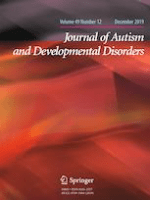
JOURNAL OF AUTISM AND DEVELOPMENTAL DISORDERS
Championing rigorous research for meaningful change.JOURNAL OF AUTISM AND DEVELOPMENTAL DISORDERS, published by Springer/Plenum Publishers, is a premier academic journal dedicated to advancing knowledge in the field of autism and related developmental disorders. With an impressive impact factor reflecting its reputation for rigorous peer-reviewed research, this journal has firmly established itself within the Q1 category of Developmental and Educational Psychology, ranked #32 out of 360 journals in its category, placing it in the top 91st percentile. The journal covers a broad range of topics, including intervention strategies, developmental trajectories, and the neurobiology behind autism spectrum disorders, making it an essential resource for researchers, educators, and clinicians alike. Since its inception in 1979, the journal has maintained a commitment to disseminating significant findings that can contribute to better understanding and support for individuals with developmental disorders, promoting interdisciplinary dialogue and collaboration. While it is not offered as open access, the Journal of Autism and Developmental Disorders remains a vital platform for the dissemination of transformative research in this crucial area.

AUTISM
Transforming perspectives in developmental and educational psychology.AUTISM, published by SAGE Publications Ltd, is a leading journal in the field of Developmental and Educational Psychology, recognized for its significant contributions to understanding autism spectrum disorders. With an impressive impact factor, AUTISM ranks in the top 94th percentile among developmental and educational psychology journals, placing it in the prestigious Q1 quartile as of 2023. Since its inception in 1997, this UK-based journal has served as a vital resource for researchers, practitioners, and students, providing a platform for high-quality empirical research, reviews, and theoretical discussions that address contemporary challenges and advancements in autism research and practice. Readers can expect to find innovative studies that influence policy, education, and treatment methodologies, making AUTISM indispensable for those dedicated to enhancing the lives of individuals on the spectrum.

Neuropsychiatric Disease and Treatment
Bridging Research and Practice in NeuropsychiatryNeuropsychiatric Disease and Treatment, published by DOVE MEDICAL PRESS LTD, is a prominent open access journal dedicated to advancing the field of neuropsychiatry. Since its inception in 2009, this journal has provided a platform for the dissemination of high-quality research on innovative therapies and treatments for neuropsychiatric disorders. With an impressive Q2 ranking in Psychiatry and Mental Health and a Q3 ranking in Biological Psychiatry as of 2023, it holds a reputable position within the scholarly community, reflecting its commitment to impactful research. The journal's open access model ensures widespread accessibility, fostering collaboration and dialogue among researchers, clinicians, and students worldwide. The journal accepts a variety of article types, including original research, reviews, and case studies, encompassing a range of topics from pathophysiology to therapeutic advancements. With its base in New Zealand and a Scopus rank placing it within the 69th percentile of Psychiatry and Mental Health, Neuropsychiatric Disease and Treatment is an essential resource for those dedicated to understanding and treating the complexities of neuropsychiatric conditions.

Review Journal of Autism and Developmental Disorders
Exploring the frontiers of developmental disorders.Review Journal of Autism and Developmental Disorders, published by Springer Heidelberg, stands as a leading platform for the dissemination of groundbreaking research in the realm of autism and developmental disorders. With an ISSN of 2195-7177 and an E-ISSN of 2195-7185, this journal not only showcases high-quality research but also emphasizes the crucial intersections between behavioral neuroscience, cognitive neuroscience, developmental neuroscience, and psychiatry. Notably, the journal has achieved a prestigious Q1 ranking across these categories, reflecting its impact and relevance; it ranks 10th in behavioral neuroscience and 5th in developmental neuroscience within Scopus metrics. Spanning from 2014 to 2024, the journal is dedicated to fostering a deeper understanding of autism spectrum disorders and related conditions, making it indispensable for researchers, clinicians, and students alike. While it operates under a traditional access model, the quality of the peer-reviewed articles ensures that it remains a valuable resource in the academic community.
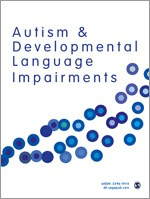
Autism & Developmental Language Impairments
Bridging research and practice for a brighter future.Autism & Developmental Language Impairments is a pioneering peer-reviewed journal published by SAGE Publications Inc that focuses on advancing the understanding of autism spectrum disorders and language impairments across the developmental spectrum. Since its inception in 2016, this open access journal has provided a platform for researchers, practitioners, and educators to disseminate innovative research findings, clinical practices, and theoretical insights, reaching a global audience. The journal is notably indexed in prestigious databases and has established its credibility with a remarkable Rank of Q2 in both Clinical Psychology and Developmental and Educational Psychology as of 2023, solidifying its importance in these vital fields. Based in the United Kingdom, it addresses crucial issues in mental health, reflecting a commitment to fostering advancements that seek to enhance the lives of individuals affected by developmental language impairments. As it converges into its next phase from 2016 to 2024, Autism & Developmental Language Impairments continues to play an essential role in bridging gaps between academia and practice, making it an invaluable resource for researchers, clinicians, and students dedicated to this critical area of study.